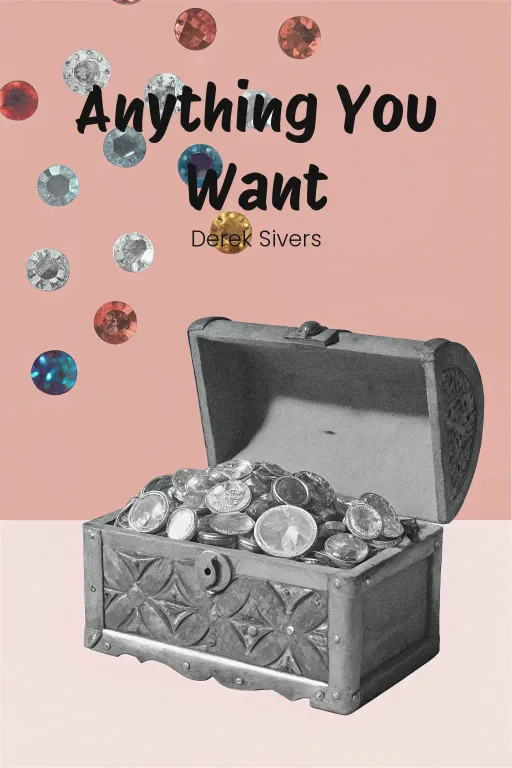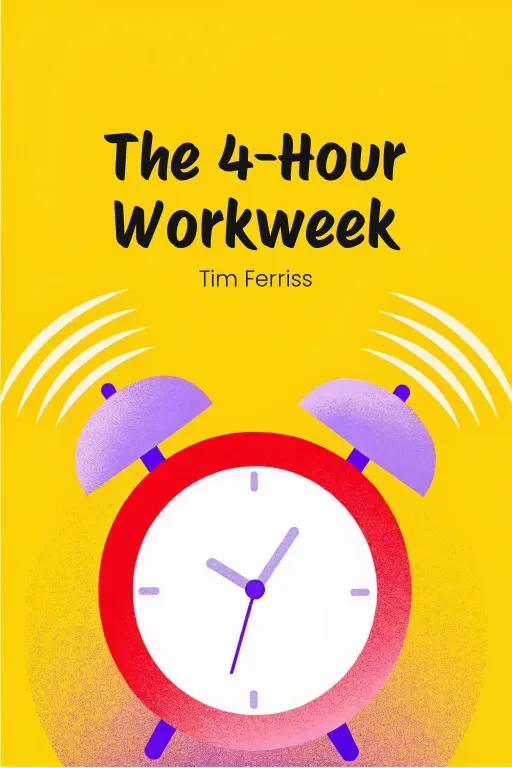
Biz With Soul: Happiness-First Growth
Podcast by Let's Talk Money with Sophia and Daniel
40 Lessons for a New Kind of Entrepreneur
Biz With Soul: Happiness-First Growth
Part 1
Daniel: Hey everyone, welcome back! Ever wonder if you could build a business that’s not just profitable, but actually makes you feel good? One that doesn't leave you totally burnt out or force you to make shady compromises? Because today, we're diving into a really cool approach to doing just that. Sophia: Yeah, and the cool thing is, this isn't about chasing the latest trends, like “scaling” or “hustling” non-stop. This comes from Derek Sivers, the guy who created CD Baby, remember? He turned a simple side project for indie musicians into a $20 million company! The best part? It all started with a simple “Buy Now” button and a whole lot of heart. Daniel: Exactly! In his book, Derek talks about how he built the company based on what he truly believed in—making customers happy, keeping things simple, and really focusing on what made him happy, not just chasing the biggest numbers. I think what’s so great is that every step shows us how staying flexible and really knowing your purpose can lead to success and feeling good about it. Sophia: Right, right, but here's where it gets interesting, because we’re not just going to admire his story from afar. We’re going to break down his ideas and see how they can actually apply to your own life and work. First off, we'll talk about why your business or career should be a reflection of what you genuinely enjoy, not just what the outside world or a business plan tells you is the "right" thing to do. Daniel: Then, we're going to jump into the whole idea of taking action, even when things aren't perfect. We'll discuss why waiting for that "perfect" plan can actually kill your chances, and how experimenting, even if it’s messy, can be life-changing. Sophia: And finally, the part I’m really curious about – how treating your customers like family, like real family, can build this crazy loyalty that becomes the core of your entire brand. I mean, let’s be honest, who wouldn't want customers who feel like your business really "gets" them? Daniel: Absolutely! We've got a lot to get through, so buckle up as we walk you through a story and a philosophy that might just change how you see life and work. This should be fun!
Aligning Business with Personal Values
Part 2
Daniel: Okay, Sophia, let's jump right in. Derek Sivers starts with this pretty radical idea: build a business around what truly makes you happy. Sounds simple enough, right? But think about how often people launch businesses just chasing trends, or wealth, or the approval of others, and end up burning out or feeling completely lost. Sophia: Exactly! It's that constant noise of what society expects, or what your investors want. It’s like this invisible checklist: "Go big, scale fast, dominate!" And if you don't, you’ve somehow failed. Sivers is basically saying, "Nah, I’m just going to do what makes me, and the people I care about, happy." Daniel: And that self-awareness is the foundation of it all. He asked himself, “What truly motivates me? What problems do I actually want to solve?” And for him, it was helping independent artists, like himself. Musicians who were tired of being ignored or controlled by major labels. That frustration led him to create CD Baby. Sophia: Right, it wasn't some Silicon Valley plan to disrupt the music industry. It was, “How do I solve this problem that I really care about?” And it couldn't have been more personal, I mean, he was a musician! He was his own customer. Daniel: Absolutely, and that’s what’s so great about it. He wasn’t following a standard business plan; he built a platform that mirrored his own passion and values. I mean, how many entrepreneurs do you know who actually start a business with the singular idea of, “The whole point is to be happy, and to only do what makes you happy”? Sophia: But here's the real challenge, Daniel: how well does that hold up when reality sets in, you know? When the business gets complicated, when the bills start piling up and customers are demanding more. It’s easy to say "Stay happy!" But does reality force you to compromise? Daniel: It's a fair point. And yes, reality can challenge your ideals. That’s why his approach is so interesting—he didn’t give in to those pressures. Instead of chasing extreme growth or trying to appease investors, he ran his business in a way that felt right to him, felt authentic. For example, he turned down working with major labels, even though it might have brought in more money, because he knew it would clash with his mission of supporting indie artists. Sophia: Okay, here’s what I’m thinking, he kind of treated his business like a canvas, right? He wasn’t just mass-producing generic "solutions;" he was painting a picture of what he wanted the world to look like. Take the famous shipping confirmation email—do you remember that one? The over-the-top, golden-box joke? Daniel: Oh, yes! "Your CD has been lovingly placed onto a satin pillow..." Customers were blown away by that email! It wasn’t about efficiency, or growth hacking; it was about delighting people, sharing joy, and creating a real connection. Think about how unusual that is in business today, where everything feels so… automated, and almost sterile. Sophia: But let's be honest—a quirky email is fun, but does that kind of customer-first care truly make a difference to a business, or is it just a bit of fun? I mean, when you're busy running a company, how much time can you spend making individual customers smile? Daniel: Well, here’s what Sivers clearly understood: those small, human touches are the business. It’s not just a sideshow, it’s the heart of everything. People connected so deeply with CD Baby because it felt so authentic to him. That single email may have been playful, but it told customers: "We care about you, not just your money." And that authenticity builds a lasting loyalty that you just can’t buy through traditional marketing. Sophia: Okay, I can see how that builds a community, creates a culture. But let's bring this down to a personal level. Sivers talks about "being over having." What does that mean for someone who's trying to launch a business or make a career change? Daniel: Great question! It means prioritizing your experience of the journey over whatever rewards people talk about at the end. For Sivers, success wasn’t about chasing endless growth, or prestige, or money. He chose to focus on how his daily work made him, and others, feel. It’s being, not having. It’s creating a business you enjoy running, rather than one that just drains you dry. Sophia: So this is like, the anti-materialistic entrepreneur's manifesto. Remember when he said, "I want my business to be smaller, not bigger"? That's so counterintuitive for anyone who's been taught that success = scale. No wonder he didn’t want investors—they'd have pushed him in the exact opposite direction of where he wanted to go. Daniel: Exactly! Investors want returns, not joy. By staying independent, Sivers could build exactly what he envisioned. And really, his story reminds us that we should tune out all the noise and ask ourselves: What kind of life am I designing here? Entrepreneurship is not just about the output; it can mirror our core values, our passions. And that’s where fulfillment truly comes from. Sophia: Okay, I'll admit it—there’s something appealing about rejecting external pressure. But Daniel, isn’t there a danger of, well, just dreaming, rather than doing anything? How do you balance that idealism with actually getting things done? Daniel: Sivers would probably argue that they're linked. He didn’t wait for everything to be perfect; he started right where he was, with what he had available. He built CD Baby out of a real need for musicians—but he infused purpose and care into it right from the start. That's the balance: act now, but stay true to your values as you move forward. Sophia: So basically, it's not about being reckless or overly idealistic. It's about being intentional—solving a real problem while sticking to what’s important to you. Okay, I get it. But let's dig into this one idea a little more: rejecting materialism. When does "being over having" stop being practical, like when the bills need to be paid? Daniel: That’s where clarity is essential: you need to know your priorities. Sivers wasn’t reckless; CD Baby was a profitable business—but those profits were a means, not the end goal. He kept his life simple, he stayed focused on what really mattered. It’s figuring out “enough” for yourself, and then resisting that constant cycle of always wanting more. Does that make sense? Sophia: Totally. It's like rethinking the whole race—don’t try to win by running faster, win by running differently.
Execution Over Ideas
Part 3
Daniel: Exactly! And that “execution over endless ideation” mindset is so Sivers. He's practically shouting, "Stop dreaming, start doing!" He wasn’t waiting for some groundbreaking idea to fall into his lap. He just found a problem he cared about, rolled up his sleeves, and started solving it—even if things were a little clunky at first. Sophia: Right, and that's what I find so appealing. It's so unglamorous, isn't it? No Hollywood montage, no sudden flash of brilliance, just a guy learning to code so his musician buddies could sell their CDs. It’s not about genius, it’s about grit. Daniel: Absolutely! It's grit and curiosity over grandeur. Sivers believed ideas are a dime a dozen. They’re everywhere, right? But execution, that's what separates the doers from the dreamers. Remember that "Buy Now" button he added to his website early on? Simple, right? But that was the catalyst. One small action, and boom—domino effect. Sophia: And let’s be clear, that button wasn't the polished beginning of some grand platform. It was probably messy, buggy, maybe even a little awkward, but it worked. That’s the real brilliance, I think: no overthinking, no paralysis by analysis. Just start and refine as you go. Daniel: Exactly, and he did refine! He didn’t stop with that first version of CD Baby. Every hurdle he faced—credit card processing, distribution, customer requests—he tackled it step by step. He saw those challenges as puzzles, not roadblocks. Sophia: Okay, but Daniel, let me push back a little here. Isn’t that kind of risky? What if you pour your energy into a terrible idea? Sivers got lucky that his "clunky" start evolved into something viable. But what if it hadn't? How do you know if an idea is even worth pursuing in the first place? Daniel: That’s a fantastic point, Sophia, and I think Sivers would argue…you don't necessarily know. And that’s the point! You don’t need absolute certainty; you need momentum. His philosophy suggests that the act of execution itself exposes the validity, or lack thereof, of an idea. It’s that classic feedback loop: you act, you learn, you iterate. Sophia: So... stop trying to predict the future with endless forecasting, just let the market slap you back to reality? Bold move. Also, kinda terrifying, though. Daniel: It can be, especially if you're clinging to this idea of perfection. But perfection is the enemy of progress. Sivers’ journey with CD Baby proves that mistakes are part of the deal, not something to fear. When other musicians wanted to use his site, he could've balked, thinking, "This wasn't the plan!" Instead, he pivoted, and built a whole new business model. Sophia: So, mistakes aren’t failures, they’re course corrections. That’s a big mindset shift. Most people would call that "pivoting," but Sivers seems to see it as organic evolution, like the business naturally grows towards its ideal form, doesn't it? Daniel: Exactly. His willingness to listen—to his customers, his gut, the market—that’s what stands out to me. That adaptability was critical. He didn’t cling to what he wanted CD Baby to be; he honed it based on what his users needed it to be. And that’s a lesson anyone can take to heart, entrepreneur or not. Sophia: That's a great point – not clinging to the original shiny vision. But let's get practical. If you're constantly tweaking, doesn’t that make you a bit... directionless? How do you balance flexibility with focus? Daniel: You’ve got to anchor yourself in your core mission. For Sivers, that was helping independent artists. Everything else—processes, platforms, revenue models—those could evolve, but the core mission stayed the same. It’s like having a compass instead of a rigid roadmap. You know your destination, but you’re open to different routes. Sophia: Okay, I get that. But let’s go back to his bootstrapping philosophy. Sivers claims starting with no money can actually be an advantage. How does that even work, Daniel? Daniel: It’s counterintuitive, but there’s a logic to it. When you’re working within constraints, you're forced to focus on what actually matters. No fancy office, no unnecessary software subscriptions. Just clear priorities and creative problem-solving. Sivers didn’t need piles of funding to start CD Baby—he used basic tools and scaled slowly and steadily. Sophia: Yeah, but doesn’t that lack of funding limit you? There’s something to be said for having resources to fall back on. What if CD Baby had failed early on without that support? Daniel: True, it could have. But Sivers valued the freedom that came with bootstrapping. Without investors, he didn’t have to justify every decision. He could stay laser-focused on serving his customers. And remember, growth wasn’t his primary goal, sustainability and joy were. That changes everything. Sophia: So, his decision to bootstrap wasn’t just financial, it was philosophical. Investors would've demanded exponential growth, which wouldn't align with his mission. By staying lean and self-funded, he protected the soul of his business. Daniel: Exactly. It’s a lesson in intentionality, not just about how you execute, but why you’re doing it. Sivers didn’t shy away from challenges, he embraced them because they aligned with his bigger mission. That’s how execution becomes meaningful, not just something you do to achieve a result, but something you value in and of itself. Sophia: Alright, I'm on board with the philosophy – build lean, act fast, iterate often. But say someone’s launching a side hustle right now. What’s the one actionable takeaway from Sivers’ story? Daniel: Start. Just start, you know? Don't wait for perfect timing or perfect execution, because those don't exist. Tweak as you go, but you'll never know what works, or what doesn't, until you take that first imperfect step. Remember, Sophia: ideas are cheap. Execution is where the value lies.
Customer-Centric Growth
Part 4
Daniel: So, when you're trying to execute, staying adaptable is key, right? Sivers was a master at this—his customer-centric approach wasn't about aiming for impossible perfection. It was all about connecting with people on a human level and actually listening to what they needed, instead of pushing what you thought they should want. Today, we're looking at how to scale ethically while keeping things authentic, something he was amazing at. Sophia: You know, that’s a tough balance, isn't it? Scaling up often feels like it kills what made something special in the first place. Think of that tiny restaurant you adore, where the owner knows your order. Then they start franchising, and suddenly it's just another soulless chain. How do you grow without losing that personal connection? Daniel: Exactly! That’s the million-dollar question, Sophia. Derek Sivers nailed this with CD Baby. He didn't go for flashy marketing or growth for the sake of growth. It was all about staying connected to his customers. For him, growth came from creating experiences that felt real, personal, and genuine. Take that famous CD Baby shipping confirmation email, for example. Sophia: That email! It's practically required reading in branding classes now. You order a CD, and instead of a boring "Your order shipped" message, you get this wonderfully over-the-top description of your CD being treated like royalty. Satin pillow? Golden box? It's cute, but... really, why did something so small make such a big splash? Daniel: Because it wasn't about what they said, Sophia, it was about how it made people feel. That email wasn't just an update; it was a moment of surprise, a reason to smile. Sivers understood that just selling CDs wasn't enough; he wanted to inject a bit of joy into what could have been a boring transaction. It was his way of saying, "We appreciate you. You're not just another number." Sophia: I hear you, but I’m still not entirely convinced. Making people smile is great, but does this whimsical stuff actually translate into real results? I mean, a chuckle over a shipping confirmation doesn't guarantee loyalty, let alone recommendations. Daniel: Oh, it does! And that’s where the magic happens. Customers were so delighted that they shared the email, talked about it online. It gave CD Baby a personality, a story that traditional advertising couldn't buy. Plus, it created genuine loyalty. People wanted to support a company that wasn’t just selling CDs but making them feel valued. Sophia: Okay, that's smart, but let's be real. How many businesses have the time to write elaborate, poetic emails? Especially when they're trying to grow? Wouldn’t these personal touches disappear as things get busier? Daniel: Well, that's where Sivers' genius comes in. He didn't make himself the bottleneck. From day one, he built a culture where these small gestures were the norm. His team adopted that way of thinking, and he kept things simple enough that they could scale without sacrificing that special something. It's a reminder that personalization doesn't need to be complex. It's about intention and consistency. Sophia: Right, consistency. Okay, let’s talk about something bigger: policies. Sivers didn't just try to delight customers; he also really seemed to trust them. No strict return policies. Not treating everyone like they were trying to scam you. That sounds risky, though! How did he manage that and still stay in business? Daniel: He made empathy and fairness a priority. Instead of creating rigid rules to prevent a tiny percentage of people from gaming the system, he focused on keeping the vast majority happy. Take refunds, for example. He didn't nickel and dime everything. He simply asked, "What can we do to make this customer feel valued?" Even if a solution cost a bit more upfront, the goodwill it created was worth it in the long run. Sophia: So, instead of assuming the worst, he gave people the benefit of the doubt. I like that—it’s a pretty optimistic view. But was it scalable? Did this trust-at-all-costs approach work as CD Baby got bigger? Daniel: Surprisingly, yes. When customers believe you genuinely care about their best interests, most won't take advantage of you. Trust breeds trust, right? And when you’re transparent about your approach—like CD Baby was—it has a ripple effect. Over time, those loyal customers became advocates. They told others about the service, recommended it to their musician friends, and the business grew organically. Sophia: That’s actually really refreshing. So many companies seem to operate on the assumption that everyone's out to cheat them, and then punish everyone for the potential misdeeds of a few. But Sivers did the opposite. Takes courage, doesn’t it? And a belief in people. Daniel: It does. It also takes simplicity. That’s another key to his success—keeping things easy, both for customers and for the business. Whether it was his transparent pricing for musicians—a flat setup fee and a percentage of sales—or the user-friendly platform, Sivers avoided overcomplication at every turn. Sophia: Let me guess: simplicity wasn’t just about convenience. It was part of the bigger philosophy, wasn’t it? Daniel: Exactly! Complexity leads to frustration. When customers or partners get bogged down in confusing fees or processes, trust goes out the window. Sivers realized that simplicity creates clarity, and clarity builds trust and ease. CD Baby’s pricing wasn’t just a model; it was a statement: “We have nothing to hide.” And keeping the internal operations streamlined meant his team could focus on what really mattered—serving musicians and customers. Sophia: Yeah, “simple” is often seen as unsophisticated, but it takes more effort and discipline than loading a product or platform with features nobody asked for. Daniel: Absolutely. Simplicity was the foundation for customer-centric growth, allowing Sivers and his team to focus on building real relationships instead of firefighting. It’s a good reminder that growth doesn’t have to mean losing who you are—you just have to make sure everything you do is rooted in purpose.
Conclusion
Part 5
Daniel: Okay, let’s bring this home. Today we dove into Derek Sivers’ story with CD Baby and the really crucial lessons behind its success: building a business from a place of personal happiness, actually “doing” stuff instead of chasing some perfect ideal, and truly connecting with your customers. His story really shows us that entrepreneurship doesn't have to be this crazy, non-stop hustle or this pursuit of endless growth. It can actually reflect who you are and what you truly care about. Sophia: Yeah, and the thing that really stuck with me is how much of this comes down to balance, right? Starting messy but staying focused, figuring out what "enough" actually means instead of chasing infinite growth, trusting people, but keeping things simple. Honestly, it’s almost more of a philosophy for life than just a business strategy. Daniel: Exactly! And the big takeaway here, I think, is pretty straightforward: whether you’re building a company, or switching careers, or going after a passion project, just ask yourself: "What kind of life do I actually want to create? What really fulfills me?" Then, start small, stay flexible, and let your values be your guide. Because success isn't just about the stuff you achieve, it's about how the journey “feels”. Sophia: So, maybe the real question for all of us is: Are we building something that reflects our values, or are we just kind of following someone else's script? I think that's worth thinking about. And of course, take one bold step today, even if it feels a bit imperfect. Because ultimately, execution is where the real magic happens. Daniel: I love that, Sophia. Just start where you are, trust that process, and don't forget to add a little bit of joy along the way. Until next time!









